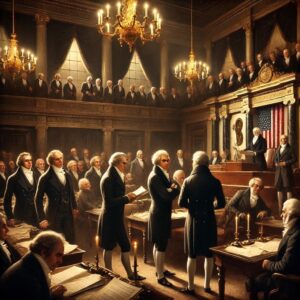The election of 1824 was unlike any other in American history. It was messy, controversial, and full of political intrigue—the kind that still sparks debates today. With four major candidates battling for the presidency, the race was intense, but when the dust settled, no one had won a clear majority. For the first time, the decision went to the House of Representatives, where a backroom deal—what Andrew Jackson called a “corrupt bargain”—changed everything. The election not only exposed deep political divisions but also reshaped the future of American democracy.
The four candidates—Andrew Jackson, John Quincy Adams, William Crawford, and Henry Clay—each had strong support from different regions of the country. Jackson, the war hero, was wildly popular, especially in the South and West. Adams, the son of a former president, was the favorite of New England. Crawford, a seasoned politician, had backing from the South, while Clay, the “Great Compromiser,” was a strong voice for the West. When the votes were counted, Jackson had the most popular and electoral votes—but not enough to win outright. According to the Constitution, that meant the House of Representatives would decide the winner.
Here’s where things got interesting. Henry Clay, who had finished fourth and was eliminated from the race, happened to be Speaker of the House—the very body that would now determine the presidency. He threw his support behind Adams, and in a move that shocked many, Adams won the vote in the House and became the sixth president of the United States. Not long after, Adams appointed Clay as his Secretary of State, a position often seen as the stepping stone to the presidency. To Jackson and his supporters, this was proof of a corrupt deal between Adams and Clay, and they never let the country forget it.
The aftermath of the election was just as important as the election itself. Jackson, feeling robbed, spent the next four years rallying his supporters, painting himself as the true voice of the people and Adams as an out-of-touch elitist. The bitterness of the 1824 election directly led to the rise of the Democratic Party, with Jackson at its head. By the time the next election rolled around in 1828, Jackson had built a powerful political movement—and this time, he won in a landslide.
The election of 1824 was more than just a controversial outcome; it was a defining moment in American politics. It exposed flaws in the electoral process, deepened divisions between political factions, and set the stage for a more democratic (and often more combative) political system. The accusations of a “corrupt bargain” lingered for years, fueling a growing distrust of politicians that still echoes in modern elections. In many ways, it was the first real glimpse of the passionate, divided, and sometimes messy nature of American democracy.

